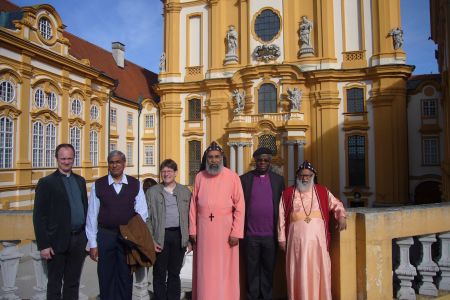A commission of members from the Mar Thoma Church and the Old Catholic Churches of the Union of Utrecht met in St. Pölten, Austria, from 1 to 6 October 2012 for their second theological consultation as part of a pre-dialogue between the two churches. The consultation covered:
- The understanding of scripture and tradition in the two churches (speakers: Bishop Dr. Isaac Mar Philoxenos, Prof. Peter-Ben Smit)
- Christology (speakers: Prof. K. G. Pothen, Revd. Dr. Adrian Suter)
- Commemoration of the dead and of the saints (Referent: Prof. Peter-Ben Smit)
These were identified last year at the first theological consultation at the Santhigiri Ashram, Aluva, India, as areas that should be further discussed. At the second consultation, the standpoints of each church and their shared positions were summarised in a joint statement (the “St. Hippolytus Statement”). This report draws on the joint statement, but its content is the sole responsibility of the author.
Broad consensus was established in all three areas under discussion. Differences between the two churches were discussed openly, and each church acknowledged the motives of the other for any divergences. Any prejudices and concerns that the other church’s view may be caused by insufficient theological reflection were soon cast aside. The commission found that none of the differences mentioned were of a nature that would separate the churches. Furthermore, it maintains that the inspiring presentations and fruitful discussions not only promoted a mutual understanding of the theology of each church, but also deepened the shared reflection on the manifold riches of God’s mystery.
The discussions concerning scripture and tradition concluded that both churches acknowledge the Scriptures as the first rule of faith from which all church tradition stems. At the same time, they are aware of the need to interpret them for the modern world. Scripture must be inculturated into the context of each generation anew – but the interpretations of earlier generations, especially in the tradition of the early church fathers and the councils, remain highly valued today.
The Mar Thoma Church follows the Hebrew canon for the Old Testament, while the Old Catholic Church uses the Septuagint. However, as the Old Catholics ascribe greater canonicity to the Hebrew writings of the Old Testament than to the “deuterocanonical” books (and has done since 1874), no major weight was attached to this difference.
The participants were particularly eager to hear the presentations on Christology, a central theme in which consensus is by no means given due to differences in tradition. The Mar Thoma Church acknowledges only three Ecumenical Councils. It does not recognise the fourth Ecumenical Council of Chalcedon, which is of fundamental importance to the Christology of the Old Catholic Church. The Mar Thoma delegates explained, however, that this non-recognition does not imply rejection. The churches of the East Syrian tradition, from which the Mar Thoma Church emerged, did not take part in the fourth Ecumenical Council, so it did not become relevant in this tradition. Neither did these churches take up sides in the fifth-century Christological debates before, during and after Chalcedon.
Agreement was reached that Jesus Christ is both human and divine, but only one Lord and Saviour, not two. One-sided Christologies that emphasise his humanity but not his divinity, or vice versa, should not be accepted. It is of secondary importance whether this conclusion is reached as an interpretation of Chalcedon (as in Old Catholic theology) or independently of it (as in the Mar Thoma Church).
The subject of Mariology was also discussed in a Christological context. Veneration of the Virgin Mary is not practised in the Mar Thoma Church; it was abolished during a 19th-century reformation as a consequence of earlier veneration practices that were judged to be exaggerated and improper. Respect for Mary as the Mother of God is, however, very strong. The Old Catholic veneration of Mary is motivated on Christological grounds; Mary was blessed with giving birth to the Infant Jesus and accepted the will of the Lord in faith. The Mar Thoma delegates share this theological assessment and are of the view that the Old Catholic veneration of Mary is theologically qualified and avoids improper exaggerations. It is not acceptable to either church to ascribe to Mary a special soteriological status such as co-redeemer.
Neither does the Mar Thoma church practise the veneration of saints, and prayers for the dead are avoided. It does, however, share the Old Catholic view that the church represents a communion of believers even after death, and it commemorates and reveres the saints as role models. Old Catholic prayers for the dead make clear that the communion continues beyond death; praying for peace for the deceased does not restrict God’s free grace. Asking the saints to intercede with God is a way of emphasising this communion of all believers as the Body of Christ. The belief that the prayers of saints carry more weight, or that the saints are even mediators of salvation, independent of Christ and equally worthy of adoration, is completely foreign to Old Catholic theology and religiosity. Teachings and practices of this kind are not accepted by either church. The commission therefore concluded that the teaching and practice of both the Mar Thoma Church and the Old Catholic Church are scriptural and legitimate despite the differences in details.
The theological discussions were accompanied by morning and evening prayers and scripture readings. On Friday Bishop Dr. John Okoro, the co-chair of the commission, led a service of Eucharist in the parish church of St. Pölten. A trip to Melk Abbey gave the Indian guests an insight into the local Christian tradition and spirituality. They very much appreciated the warm hospitality of the Old Catholic Church of Austria and the St. Hippolytus educational centre in St. Pölten, and the smooth organisation of the consultation.
This second consultation concluded with strong goodwill on both sides and a shared interest in strengthening the ties between the two churches. The Mar Thoma delegates were Suffragan Metropolitan Bishop Dr. Zacharias Mar Theophilus, Bishop Dr. Isaac Mar Philoxenos and Prof. K. G. Pothen; attending for the Old Catholic Churches of the Union of Utrecht were Bishop Dr. John Okoro (Austria), Prof. Peter-Ben Smit (Netherlands) and Revd. Dr. Adrian Suter (Switzerland). The third theological consultation will take place in India from 21 to 28 November 2013, when the Old Catholic delegates will also have the opportunity to spend a day at the clergy conference of the Mar Thoma Church.
Revd. Dr. Adrian Suter

